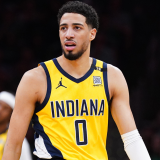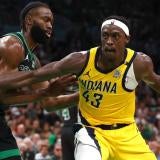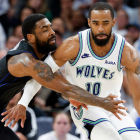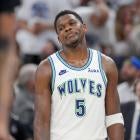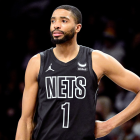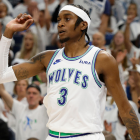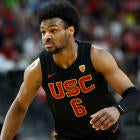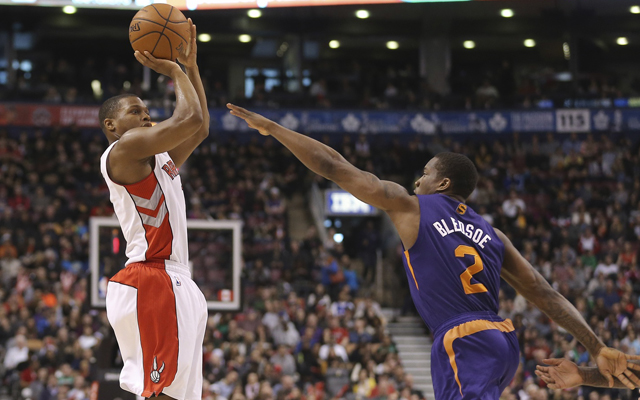
More Offseason Analysis: Coaching changes, news | Free Agency | Draft | Rumors
On Friday we released the top 40 NBA free agents this offseason effective July 1. Now we turn our attention to position rankings, separated into point guards, wings, and bigs (to reflect the modern NBA positionality, or lack thereof). We start with the point guards, in what is a fairly impressive class.
The Stars
1. Kyle Lowry, Toronto Raptors: Lowry is the top option here for a reason. Throughout his career he's molded and added something to his game every season. Early on, he was simply a dynamic driver who could finish and was strong, but gambled too much. He added a perimeter shot and learned to defend more capably and with more consistency. He's added floor generalship and learned how to be the best player on a team in Toronto.
Lowry is a bulldog on defense, and can body in the post while also attacking the dribble. He's durable and consistent, and ranked seventh in PER among all point guards playing 30 minutes per game last season. His big drawback is his notorious attitude. Clashing with coaches and teammates in Memphis as a pup was one thing, and with Kevin McHale in Houston who had trouble with several players another, but his issues in Toronto are something different. Still, under Casey, they've never boiled to the surface, and both teammates and Casey have advocated for him. He may have turned that corner last season with the Raptors. We'll see whether that means he decides to return there or not.
2. Eric Bledsoe, Phoenix Suns: He falls to second here for two reasons. One, he's never been primary point guard on a team, playing last season beside, not behind Goran Dragic. And two, he had knee surgery last year and injuries have been a problem. But outside of that? Total beast. Bledsoe is one of just a few players in the league who can chase down a player for the block in transition, grab the rebound in traffic off the second jump, scream up the floor full-speed, and knock down a transition three or get to the rim and finish through contact for the and-one. Those guys are exceptional.
That's Bledsoe. He's exceptional. He's 24 years old and made substantial leaps last season in running an offense, playing consistent minutes, and hitting from mid-range and the perimeter (36 percent from the outside). His weaknesses are diminishing and his defense is becoming overwhelming. The other downside here, though? He's a restricted free agent and the Suns have pretty much put up a giant banner that reads "COME AT US, OTHER TEAMS. WE'RE MATCHING." So any offer made to Bledsoe is definitely a smart idea, but also could hold your cap space for nothing when the Suns match.
3. Isaiah Thomas, Sacramento Kings: Above, I said that Lowry finished sixth among all point guards playing 30 minutes per game. Thomas finished fifth, despite being just 5-9. That's pretty good. He averaged 6.3 assists to Goran Dragic's 5.9, and scored 20.3, same as Dragic. (Dragic is a more efficient scorer.) He's lightning quick, and has the ability to take over a game, something I tend to value more than others. Having those guys who can just level you for a quarter wins a lot of games.
The problem, of course, is the size. He's just can't defend guys in the post. He gets shot over on the perimeter, which is why you can't hide him on shooting guards, and can get brushed into the third-row if the driving opponent can avoid the offensive foul. Thomas' attitude is something to behold, though. He keeps coming, no matter what, and legitimately has higher gear than 90 percent of the league. You just don't know if he can work as a starter. But as a bench guy? He might be more valuable than a starting small forward for some teams. Thomas can shift games by himself.
The Value Meals
4. Shaun Livingston, Brooklyn Nets: Livingston has reinvented himself several times. First he was the frustrating Clippers youngster who couldn't put it together. Then he was the tragic young guy cut down by one of the most traumatic knee injuries we've ever seen. Then he was the valiant guy who had come back from that injury to be a decent role player.
Then last season, he became something else. Livingston was downright good. Let's put it this way: The Nets were able to start Livingston over Deron Williams to let Williams get back up to speed and got away with it. Livingston started 54 games last season for Brooklyn, in place of or beside Williams. He averaged 11.5 points and 4.5 assists per 36 minutes for Brooklyn, ran the offense, forced constant turnovers and generally was terrific. Can he do that as a full-time starter? No. We're past the starter range already. But Livingston gets you a big point guard who can defend multiple positions, hit from mid-range, and generally run point. He's not a three-point shooter, but he can create off the dribble. As a reserve combo-guard, he's an excellent option.
5. Patty Mills, San Antonio Spurs: Mills made himself a ton of money in the Finals. I'm not convinced he's the fifth best point guard here. I'm not convinced he's a point guard. He's a scoring point if anything, a gunning point if we're being accurate. But that Finals performance, as well as a good reputation out of San Antonio will get him paid.
He's not the playmaker Vasquez is, the floor manager Blake is, the defender Harris is. But he shoots 43 percent from three, will take, and make, big shots, and understand show to play winning basketball thanks to that time with the Spurs. He's 25, so he's got years ahead of him, and he played in 81 games last year. He's worth the investment.
6. Greivis Vasquez, Toronto Raptors: The Point Guard That Wouldn't Die. Greivis Vasquez wasn't supposed to be drafted. Then he wasn't supposed to make the team with Memphis. Then he wasn't supposed to play. Then he wasn't supposed to be good. Then he wasn't supposed to contribute outside of Memphis. And he has.
He found a great role in Toronto, as a reserve playmaker behind a score-first point in Lowry. That's a great situation for him. He's frustrating on defense, both for physical and mental reasons, and he presses to try and rack up assists, which infuriated Monty Williams in New Orleans. But Vasquez is a good point guard with great value.
7. Steve Blake, Golden State Warriors: A quality shooter who has been a part of good teams consistently. Blake's a quality teammate and can hit decently-to-great from three depending on system (see his drop from 39.7 percent with the Lakers last year to 34 percent from three with Golden State).
Injuries have been a plague, and he plays smaller than his 6-3 height. He's also 34 years of age. But he's more consistent than most of the players on the rest of this list, so here he sits, still capable of doing the work he needs to do. He's a poor man's Derek Fisher, and while that sounds like an insult, those guys usually tend to help teams win.
The Awesome Backups
8. Devin Harris, Dallas Mavericks: Not a shooter, at 38 percent from the field last year coming back from injury and 31 percent from three. He's going to be 31 next season and injuries have taken away a lot from him.
But in the playoffs, Harris was the guy who made consistent, effective plays vs. San Antonio. Jose Calderon, recently dealt from Dallas, couldn't be on the floor defensively and the Mavs lived and died with Harris. If he can get healthy, he might be worth a three-year deal at decent money. No big investments, here, and if he's your starting point guard, you're in trouble. Did average 7.8 assists per 36 minutes, however, and that has to count for something.
9. Jerryd Bayless, Boston Celtics: Lightning quick scorer. He's learned to run a team over the years, just by sticking. He's not super efficient and sometimes will make bad decisions passing and scoring, but overall, he's a plus. As a reserve guard or a combo guard next to a dynamic pure point, he's legitimately effective.
He's not efficient from the field at 42 percent and has never been able to translate his aggression into production at the NBA level. But he's got a tough attitude, and shot 39.5 percent from three with Boston for 41 games last year. He's got a chip on his shoulder and has had it from Day 1. He's worth the mid-level, but you want to keep the years down, despite him being just 25.
10. Aaron Brooks, Denver Nuggets: You can pretty much put Brooks in the same range with any of the next five guys. He's an inefficient scorer at 41 percent from the field. Brooks can hit from the outside though, shooting 39 percent overall last season. He's small, and can get bullied defensively.
His assists tend to fluctuate with the system. If you plug him into a high-octane, high-efficiency system, he excels. Stick him in a grind-it-out team with limited options, and he'll struggle more than some replacement points. Brooks is 29, and he is what he is. And he's bounced from team to team (moved six times in three seasons including an overseas season). So he's not worth a lot here. He's here mostly because he's a do-it-all guy and a pro.
11. Luke Ridnour, Charlotte Bobcats: He's 33, otherwise he would likely be ninth on this list. A pro's pro who can shoot from three (34 percent overall last year), distribute at a decent rate (5.6 assists per 36 last season) and is a willing defender. Unlike most of the guys on this list, you can get away with Ridnour as your starting point, you just can't get high-production performances out of him.
12. Mo Williams, Portland Trail Blazers: Former All-Star so he's got that going for him. A pro, but also one who has historically struggled with accepting his fall from grace since 2010. Will hit some huge shots and is legitimately a great three-point shooter at 39 percent for his career, 37 percent last season. You can get away with him as a starter, but you'll wind up frustrated. Has a good attitude and has been a part of winning teams for most of his career. Would be a great two-year contract for a contender.
13. Mario Chalmers, Miami Heat: I'm serious, if it weren't' for the Finals, you could probably swap him and Patty Mills. But that stuff leaves an impression. Chalmers has been a part of championship teams at college and pro levels. He managed to face all the criticism for four years of the Big 3 era and hang on as starter.
He's learned to run a system, and can hit corner threes. There will be games where he kills the opponent by getting to the rim and finishing through contact, and games where he kills his own team with turnovers and poor decisions. But Rio is a good point guard overall, and could be a huge value signing this summer for a team.
14. Ramon Sessions, Milwaukee Bucks: Super aggressive and has great strength. He's a smarter player than he's given credit for and can take on challenges defensively. He's efficient at both ends, he's just not especially great in any one area. His 3-point shot year by year is like a rollercoaster. Up and down. But aggressive and a quality backup.
In Case of Emergency, Break Glass, Play Point Guard
15. Darren Collison, Los Angeles Clippers: Undersized and prone to mistakes, Collison faces a lot of criticism. But he also learned a lot from Chris Paul and has been a part of average-to-great teams for most of his career. He just doesn't stick. He's undersized and labeled as a bad defender. But he also did some great work on Steph Curry in the playoffs and has great speed. Not a bad two-year deal for a backup.
16. D.J. Augustin, Chicago Bulls: He lead the Bulls in scoring last season after signing with them after being waived. But his career arc doesn't suggest a statrer-caliber guard, but an inconsistent reserve who's good to have for stretches. He's not a lost cause, but he's neither a floor manager nor a superb scorer historically. His career numbers should overshadow his Chicago numbers, and his defense is limited due to size.
17. Jordan Farmar, Los Angeles Lakers: Crack shooter, and efficient as all get out. Also a capable defender. At 27 has some time in front of him. Honestly might be worth more of a shot than a lot of these guards, we've just never seen him play a full season outside of the comfort of LA. Can he produce elsewhere consistently?
18. Kirk Hinrich, Chicago Bulls: This pains me. I'm a big Hinrich guy. But the guy's jumpshot abandoned him and never came back. I do think for a veteran contract for a contender he's perfect. Still tough-as-nails defensively and can run a decent offense. Just can't stretch the floor and you can't put him in a position to have to produce shots.
Rounding Out The Roster
19. Garrett Temple, Washington Wizards: Underrated last season for Washington. Can give you good minutes on a small deal as a third guard. Big defensively.
20. Brian Roberts, New Orleans Pelicans: Played surprisingly well for the Pelicans last year, but will take shots that leave you thinking he's Swaggy P. Aggressive and fast, and really good with the lob in the pick and roll. Worth a two-year at age 28.
Also mentionable: Kent Bazemore, Chauncey Billups, Leandro Barbosa, Beno Udrih, Shelvin Mack, Toure Murry, Toney Douglas, Cartier Martin
Statistical support provided by Basketball-Reference.com.










